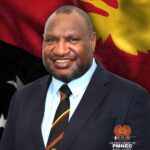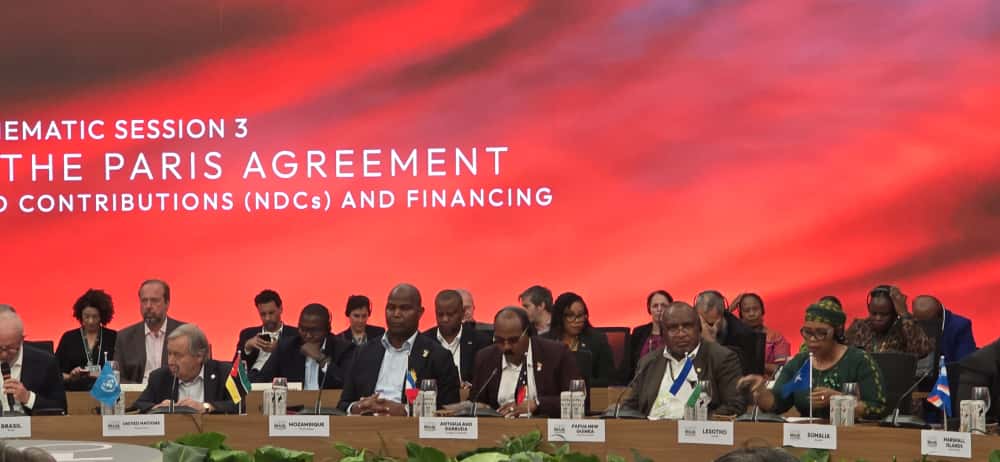Prime Minister Hon. James Marape has called for stronger global financing mechanisms to support forest and ocean nations, stressing that tropical countries like Papua New Guinea, Brazil, and the Democratic Republic of the Congo are “carrying the weight of the planet’s survival” in their fight to preserve the world’s last great carbon sinks.
Speaking during Thematic Session 3 of the Leaders’ Segment at the COP30 Climate Conference in Belém, titled “10 Years of the Paris Agreement: Nationally Determined Contributions (NDCs) and Financing”, Prime Minister Marape said the world’s forests and oceans are humanity’s most powerful allies in limiting global warming to 1.5°C.
“Forests and ocean nations are carrying the burden of the entire planet’s atmospheric balance,” Prime Minister Marape said. “The Amazon Basin, the Congo Basin, and the tropical forests of Papua New Guinea and Southeast Asia together form the lungs of the Earth. Conserving them is the greatest mitigation effort we can make to save humanity itself.”
Forests and Oceans: The Foundation of Global Mitigation
PM Marape told world leaders that his perspective on climate leadership had evolved over the years.
“When I first began this journey, I thought I was fighting to save our forests,” he said. “Now I realise I am fighting to save humanity. Our forests, oceans, and biodiversity sustain all life on Earth — and without them, we have no future.”
He reminded delegates that there is no substitute for the Earth’s natural systems, urging them not to look to other planets for survival but to preserve the one they already inhabit.
“There is no planet like Earth,” he said. “Mars and Mercury are unlivable. Here, rivers, trees, mountains, and oceans sustain life. That is worth fighting for.”
Call for Nature-Based Climate Finance and Equity
Prime Minister Marape called on developed nations and multilateral partners to channel more financing into nature-based solutions that value the preservation of forests rather than their exploitation.
“Our forests deserve proper conservation financing,” he said. “Nature-based technologies must begin by valuing standing forests — not just harvested timber. One hectare of conserved forest can save the world far more than any industrial offset.”
He urged the international community to deliver a new era of equitable climate finance that recognises the contributions of forest nations to global mitigation, through mechanisms such as jurisdictional REDD+ and carbon market systems under Articles 5 and 6 of the Paris Agreement.
Papua New Guinea’s Leadership and Global Partnerships
PM Marape reaffirmed Papua New Guinea’s commitment to halting large-scale deforestation, restoring degraded lands, and supporting sustainable development for local communities. He also highlighted PNG’s readiness to work with global partners to advance forest-nation diplomacy and operationalise long-term climate financing solutions.
“For six years as Prime Minister, I have been saying: stop deforestation. Bring real conservation that sustains livelihoods and protects humanity,” he said. “If this generation of leaders fails to find real financing solutions for forest nations, history will judge us harshly.”
Session Background: Financing Climate Commitments Under the Paris Agreement
The Thematic Session on “10 Years of the Paris Agreement: NDCs and Financing” brought together world leaders to reflect on a decade of progress and challenges in implementing Nationally Determined Contributions (NDCs) and mobilising climate finance.
Key points from the session and related discussions include:
• The session highlighted the need to fully deliver on the existing goal of mobilising USD 100 billion annually through 2025 and to set a new collective quantified goal for climate finance beyond 2025.
• Discussions emphasised the importance of transparency in implementing financial pledges and encouraging private-sector involvement in climate action.
• The session formed part of the broader World Leaders Climate Action Summit at COP30, which also featured thematic discussions on Forests and Oceans (6 November) and Energy Transition (7 November).
• European Commission President Ursula von der Leyen delivered a keynote address endorsing the Declaration and highlighting carbon pricing as a powerful climate tool to drive emissions reduction and finance sustainable development.
Prime Minister Marape’s remarks at COP30 build upon Papua New Guinea’s consistent advocacy for nature-based climate solutions and equitable financing for forest nations, reaffirming the country’s leadership as a global voice for environmental stewardship and sustainable development.






